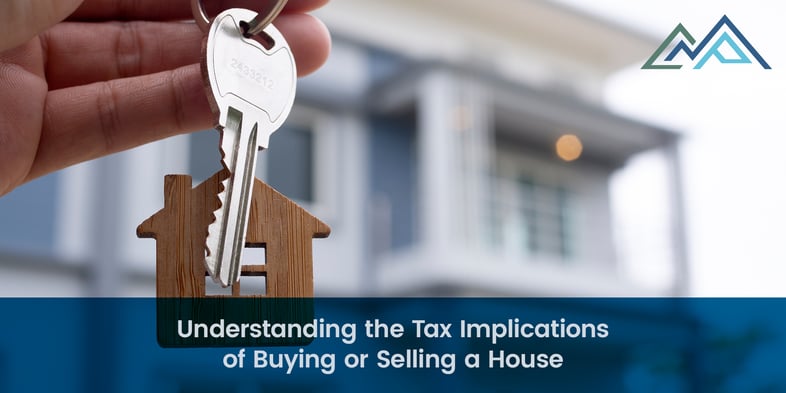Buying or selling a home can be stressful. For most people, a home purchase or sale is the biggest financial transaction they’ll complete in their lifetimes. It’s not surprising that some people feel overwhelmed and confused about the process.

At CMP, a question that people frequently ask us is:
Do I pay taxes when selling a house?
That’s an important question to ask, and so is its companion question:
What is the tax on buying a house?
Both types of transactions have significant tax implications, and this post will explain what you need to know about them, including information about tax liens, capital gains tax, and more.
Tax Implications When Buying a House
When buying your first home, there are certain advantages to you that you may not be familiar with when it comes to buying instead of renting. Those advantages will be further discussed in the next section, but we’ll talk about the amounts you can’t deduct when you purchase a house. You may not deduct:
- Your down payment on a home. A down payment is not considered a deductible expense on your federal or Utah state taxes.
- Your closing costs. However, you should keep track of these costs if you refinance because they can be used to get a profit discount when you sell your home.
- The costs associated with repairs or remodeling. This is another instance where you should keep track of what you spend because when you sell your home, you may be able to use remodeling expenses to reduce your capital gains tax.
Another thing to keep in mind is that you may be able to take an early withdrawal from your retirement plan to put toward your down payment. If you are under the age of 59 ½ and a first-time home buyer, you can withdraw up to $10,000 without paying the early withdrawal penalty. This rule applies only to traditional IRAs, not Roth IRAs or 401k accounts.

Tax Deductions on Home Purchase
You may deduct certain items on your taxes when you buy a new home. The 2017 Tax Cuts and Jobs Act (TCJA) updated and changed some of these items, and this act will affect Utah home buyers.
Let’s start with the first tax deduction you can receive, your mortgage interest. There are many misconceptions about how much interest you can deduct and how big a tax break you are likely to receive. The TCJA increased the standard deductions as follows:
- For individuals, the new amount is $12,000
- For heads of household, the new amount is $18,000
- For married couples filing jointly, the new amount is $24,000
These new amounts are important because if your total deductions add up to less than the standard amount, you may not itemize deductions. That means you will not get a tax advantage from deducting your mortgage.
However, if your deductions are higher than the standard deduction, you can and should deduct your mortgage interest on indebtedness up to $750,000 if married filing jointly, or $375,000 if married filing separately. This number applies to homes acquired after 2017 because this was the year TCJA was enacted. For homes acquired previously, the limits are $1,000,000 and $500,000, respectively.
The second major deduction is for your property taxes. The property tax is a tax in buying a house that you will be responsible for. The IRS says that “any state or local taxes based on the value of the real property and levied for the general public welfare” are tax deductible on your federal income tax. The rule does not apply to local fees that directly increase the value of your property.
Overall, the state of Utah has a property tax of 1.243%, but this can vary depending on where in Utah you are planning on buying a house. So when it comes to being able to deduct your property taxes, if you own a residential home that is you primary residence in Utah, you may exempt 45% of the home’s value from property taxes. In other words, if you had a 500,000 home, you could expect $225,000 of the value from your taxes. You would pay property taxes on the remaining $275,000 value.
Tax Implications When Selling a House
When selling a house, the most important tax implication you need to be aware of is capital gains. This is a tax on selling a house that is assigned depending on how much the house sells for and what type of owner you are. More on this will be discussed in the next section. But for now, let’s review some significant tax questions you need to answer when selling a home, including whether you may qualify for the 121 home sale exclusion:
- You may be able to use the money you spent on repairs and renovations to reduce your capital gains tax. Use this list to confirm if your expenses qualify.
- You might be able to deduct your moving expenses if you sold your home because you or your spouse is an active military member.
You should consult with a professional accountant if you have questions about which expenses are deductible.

Do I Need to Pay Capital Gains Tax on a House I Sold?
The capital gains tax (CGT) is a tax on profits you’ve received from selling an asset that you purchased at a lower cost. This is an important tax to know of because it can apply to some house sales.
When it comes to the CGT, there are many qualifications and exemptions you should know about because it may or may not apply to you if you are selling a house:
- Single owners: If you’re a single homeowner, the capital gains tax will need to be paid only if your profit exceeds $250,000.
- Married owners: If you are married and own the home jointly, up to $500,000 of your profits can avoid taxation.
- Time in home: CGT is only required if you’ve lived there for under two years. If the home was your primary residence for at least two years of the five years prior to the sale, you will not need to pay a capital gains tax.
In Utah, you may be able to deduct capital gains tax if:
- You invest at least 70% of your profits in the stock of a qualified Utah small business within 12 months of the sale; and
- You do not have an ownership stake in the Utah small business at the time of the investment.
If you do have to pay the CGT, plan on scheduling a consultation with your tax professional before filing. They can help you itemize all the qualified costs associated with buying and owning the property, which you will then be able to subtract from what you owe.
With the above specifications, it is more than likely that you will not have to pay the capital gains tax in Utah. It is important to keep a close eye on the selling process of your home because that is the only way that you will know for sure if you will have to pay this tax or not.
Tax Implications on Multiple Properties
Owning multiple properties in Utah may lead to tax deductions or more specific taxes that need to be paid at the time of purchase and/or selling. Before considering the purchase of another property, make sure that you get in contact with a financial advisor to discuss the tax implications in the state of Utah.
If you own multiple properties, you may deduct interest if you spend some time there. For example, an investment or rental property’s mortgage interest is deductible only if you live in the home for a specified period.
As of this writing, you must live in an investment property for 14 days more than 10% of the days it was rented. That means that if you had a vacation home that you rented 100 days per year, you could take the deduction provided you spent 24 days a year there.
Be sure to check out your blog post: Simplifying Tax on Rental Income.
Conclusion
There was a lot of information presented to you in the blog post – all about taxes on buying a house, taxes on selling a house, capital gains, and tax-deductible items. If any of this information leads to questions, contact our Utah accounting firm. We also have offices in Layton, Logan, and St. George, and we’re here to help.

















